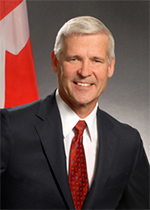Bob Hamilton
Bob Hamilton was appointed as the Commissioner of the Canada Revenue Agency (CRA) effective August 1, 2016.
Prior to joining the Canada Revenue Agency, Bob served as Deputy Minister of Environment Canada, and Deputy Minister of Natural Resources Canada.
Bob was appointed Senior Associate Secretary of the Treasury Board in March 2011 and named by the Prime Minister as the lead Canadian on the Canada-United States Regulatory Cooperation Council.
Bob has held many senior positions in the Department of Finance, including Senior Assistant Deputy Minister, Tax Policy, and Assistant Deputy Minister of Finance Sector Policy. He received his Honours BA and Master's degrees in Economics from the University of Western Ontario.
"The OECD Forum on Tax Administration (FTA) recognises the important role of the Tax Inspectors Without Borders (TIWB) initiative in supporting developing countries to build frontline tax audit capacity. In representing the FTA on the TIWB Governance Board, I look forward to strengthening the relationship between our respective organisations and working constructively to ensure the success of TIWB." - Bob Hamilton
Reflections
Q: Please tell us more about Canada’s role in TIWB
A: As with many of my Forum on Tax Administration (FTA) counterparts, Canada continues to explore effective ways to support the important work of TIWB and ensure the objectives of the initiative are achieved. There is great value in peer-to-peer assistance—tax inspectors in one jurisdiction helping tax inspectors in another—which is the hallmark of TIWB. For the Canada Revenue Agency (CRA) specifically, we anticipate that our recently retired audit experts can serve as a key resource to assist other countries under TIWB.
As you know, Canada is very supportive of this initiative and has been since its inception. In fact, TIWB will soon launch a Community of Practice on the Knowledge Sharing Platform — an online tool for sharing tax knowledge and expertise among tax administrations around the world. The Knowledge Sharing Platform was developed and is maintained by the CRA. Leveraging this technology will help support and connect experts who are actively engaged in this work.
Q: Why is TIWB important for development?
A: In order to meet the United Nations Sustainable Development Goals (SDGs), the international tax community recognises the importance of generating resources from within developing countries in order to finance their development. The cost associated with achieving the SDGs is estimated in the trillions of dollars. This is well above what international aid alone can provide. Generating revenue through effective tax systems thus is a critical building block to sustainable development.
TIWB is an important niche area where experienced auditors can provide specialised assistance and achieve tangible results in developing countries. The TIWB experience in Liberia was recently highlighted on the TIWB website as a great example of how this initiative is helping in a very concrete and practical way. In the short time since TIWB was launched, we have already seen some successes as a result of this work, including the recovery of over USD 328 million in tax revenues for governments in developing countries.
In a similar direction, Canada and China are co-leading the work of the FTA Capacity Building Network, which is fostering the collaboration of tax administrations to strengthen technical capacity worldwide. Increased tax capacity is not only important for the developing world, but for developed countries as well. The benefits of more efficient and effective tax administration are broad.
While there have been initial successes, there is much work to be done to further the TIWB objectives. A whole-of-government approach is widely identified as key to providing effective capacity building support. I firmly believe that the integration of TIWB into the broader international development agenda will be an important step in realising the TIWB goals.
Q: How would you like to see TIWB expand in 2018?
A: As TIWB moves towards its goal to deliver 100 deployments by 2020, I would like to see a focus in 2018 on having more tax experts available to fulfil this commitment. Once active, these experts will also require ongoing access to the tools and support needed to deliver quality assistance. Technology will play an important role in helping us provide this support. To this end, I would like to further explore the potential use of the Knowledge Sharing Platform to support TIWB. This tool provides a continuum of complementary resources, such as e-learning products and training or reference materials, as well as an opportunity for on-going and virtual sharing of expertise. We think that this tool can complement—and even optimise—initiatives like TIWB.
Together with other FTA Commissioners, we will continue to support the TIWB initiative. We will encourage new and innovative approaches to deploy programmes, including broadening our own co-operation with governmental development agencies (for example, in Canada, Global Affairs Canada), as well as intensifying our collaboration with international (such as the World Customs Organisation, International Monetary Fund and the World Bank Group) and regional tax organisations.


